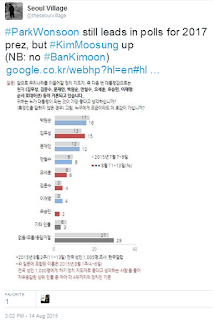In case you missed the previous episodes listed below, the highly controversial SS7017 (a.k.a. Seoul's Highline) is Mayor PARK Won-soon's pet project to crown his mandate in 2017:
- January (among Seoul's urban regeneration projects): "Diagonal crossings, High Lines, and Business Verticals (how pedestrians and businesses remodel Seoul... and vice-versa)"
- January (focus): "Seoul Station Elevated Park (Seoul Station Project 7017? The Seoul Vine?) - An Update"
- May (Winy Maas wins the competition): "Seoul Station 7017 blooms into Seoul Arboretum"
- July (mention of Seoul's intense lobbying / advertising / calls for suggestions): ""Sejongdaero" competition officially started"
- Metro Tower (10, Toegye-ro)
- Daewoo Foundation Building (18, Toegye-ro)
- Hotel Manu (19, Toegye-ro)
- Seoul Square (416, Hangang-daero)
- Yonsei Jedan Severance (Yonsei Severance Foundation - 10, Tongil-ro)
*
Now these MOUs were signed in January. So what's the actual message?
That Seoul Mayor is not giving up his dream.
The Seoul Station 7017 project is officially dead because national authorities have blocked it for many good reasons: major safety concerns, awful design ruining the surroundings of the old Seoul Station, unsolved traffic issues...
One more good reason is the fact that many people don't want PARK Won-soon to parade with a spectacular new landmark just months before the 2017 presidential elections. If Saenuri's KIM Moo-sung is closing the gap, PARK is still leading in polls that, one should note, don't include BAN Ki-moon (will the UNSG run for South Korea's most suicidal job?):
 |
| PARK Won-soon still leads in polls for 2017 prez, but KIM Moo-sung up (NB: no BAN Ki-moon): gallup.co.kr/gallupdb/reportContent.asp?seqNo=677 (twitter.com/theseoulvillage/status/632069833425727489) |
Every month of delay makes less likely a delivery on time for the elections.
Personally, I wouldn't have bet on this very risky SS7017 as my main option for a landmark. For instance, solving the Seun Sangga conundrum was also very tricky (starting with safety issues), but much more important for Seoul's balance and urban regeneration.
Still time to reassess priorities, I guess.
Seoul Village 2015
Welcome to our Korean Errlines! Follow Seoul Village on Facebook and Twitter
Add this page to your favorites
* The Hilton was not among the 5, as I wrongly thought last Friday:
 |
| Seoul announced 5 MOU with buildings for connection with Seoul Station 7017 (Hilton etc). National authorities nixed projects, PWS needed lobbying power. (twitter.com/theseoulvillage/status/634720342787796996) |














